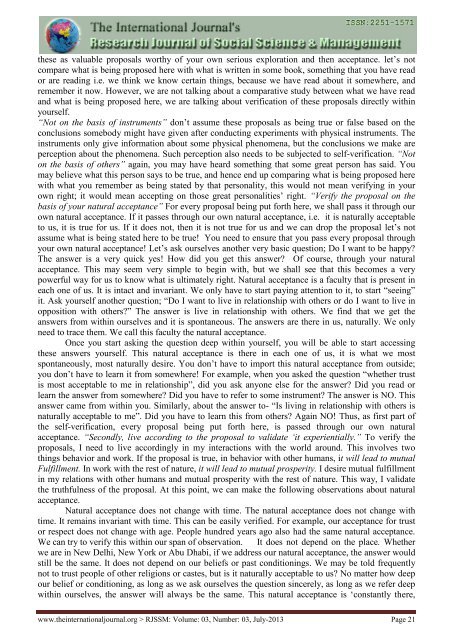Research Journal of Social Science & Management - RJSSM - The ...
Research Journal of Social Science & Management - RJSSM - The ...
Research Journal of Social Science & Management - RJSSM - The ...
You also want an ePaper? Increase the reach of your titles
YUMPU automatically turns print PDFs into web optimized ePapers that Google loves.
these as valuable proposals worthy <strong>of</strong> your own serious exploration and then acceptance. let’s not<br />
compare what is being proposed here with what is written in some book, something that you have read<br />
or are reading i.e. we think we know certain things, because we have read about it somewhere, and<br />
remember it now. However, we are not talking about a comparative study between what we have read<br />
and what is being proposed here, we are talking about verification <strong>of</strong> these proposals directly within<br />
yourself.<br />
“Not on the basis <strong>of</strong> instruments” don’t assume these proposals as being true or false based on the<br />
conclusions somebody might have given after conducting experiments with physical instruments. <strong>The</strong><br />
instruments only give information about some physical phenomena, but the conclusions we make are<br />
perception about the phenomena. Such perception also needs to be subjected to self-verification. “Not<br />
on the basis <strong>of</strong> others” again, you may have heard something that some great person has said. You<br />
may believe what this person says to be true, and hence end up comparing what is being proposed here<br />
with what you remember as being stated by that personality, this would not mean verifying in your<br />
own right; it would mean accepting on those great personalities’ right. “Verify the proposal on the<br />
basis <strong>of</strong> your natural acceptance” For every proposal being put forth here, we shall pass it through our<br />
own natural acceptance. If it passes through our own natural acceptance, i.e. it is naturally acceptable<br />
to us, it is true for us. If it does not, then it is not true for us and we can drop the proposal let’s not<br />
assume what is being stated here to be true! You need to ensure that you pass every proposal through<br />
your own natural acceptance! Let’s ask ourselves another very basic question; Do I want to be happy?<br />
<strong>The</strong> answer is a very quick yes! How did you get this answer? Of course, through your natural<br />
acceptance. This may seem very simple to begin with, but we shall see that this becomes a very<br />
powerful way for us to know what is ultimately right. Natural acceptance is a faculty that is present in<br />
each one <strong>of</strong> us. It is intact and invariant. We only have to start paying attention to it, to start “seeing”<br />
it. Ask yourself another question; “Do I want to live in relationship with others or do I want to live in<br />
opposition with others?” <strong>The</strong> answer is live in relationship with others. We find that we get the<br />
answers from within ourselves and it is spontaneous. <strong>The</strong> answers are there in us, naturally. We only<br />
need to trace them. We call this faculty the natural acceptance.<br />
Once you start asking the question deep within yourself, you will be able to start accessing<br />
these answers yourself. This natural acceptance is there in each one <strong>of</strong> us, it is what we most<br />
spontaneously, most naturally desire. You don’t have to import this natural acceptance from outside;<br />
you don’t have to learn it from somewhere! For example, when you asked the question “whether trust<br />
is most acceptable to me in relationship”, did you ask anyone else for the answer? Did you read or<br />
learn the answer from somewhere? Did you have to refer to some instrument? <strong>The</strong> answer is NO. This<br />
answer came from within you. Similarly, about the answer to- “Is living in relationship with others is<br />
naturally acceptable to me”. Did you have to learn this from others? Again NO! Thus, as first part <strong>of</strong><br />
the self-verification, every proposal being put forth here, is passed through our own natural<br />
acceptance. “Secondly, live according to the proposal to validate ‘it experientially.” To verify the<br />
proposals, I need to live accordingly in my interactions with the world around. This involves two<br />
things behavior and work. If the proposal is true, in behavior with other humans, it will lead to mutual<br />
Fulfillment. In work with the rest <strong>of</strong> nature, it will lead to mutual prosperity. I desire mutual fulfillment<br />
in my relations with other humans and mutual prosperity with the rest <strong>of</strong> nature. This way, I validate<br />
the truthfulness <strong>of</strong> the proposal. At this point, we can make the following observations about natural<br />
acceptance.<br />
Natural acceptance does not change with time. <strong>The</strong> natural acceptance does not change with<br />
time. It remains invariant with time. This can be easily verified. For example, our acceptance for trust<br />
or respect does not change with age. People hundred years ago also had the same natural acceptance.<br />
We can try to verify this within our span <strong>of</strong> observation. It does not depend on the place. Whether<br />
we are in New Delhi, New York or Abu Dhabi, if we address our natural acceptance, the answer would<br />
still be the same. It does not depend on our beliefs or past conditionings. We may be told frequently<br />
not to trust people <strong>of</strong> other religions or castes, but is it naturally acceptable to us? No matter how deep<br />
our belief or conditioning, as long as we ask ourselves the question sincerely, as long as we refer deep<br />
within ourselves, the answer will always be the same. This natural acceptance is ‘constantly there,<br />
www.theinternationaljournal.org > <strong>RJSSM</strong>: Volume: 03, Number: 03, July-2013 Page 21

















